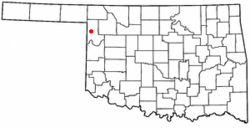Shattuck, Oklahoma facts for kids
Quick facts for kids
Shattuck, Oklahoma
|
|
|---|---|

Location of Shattuck within Oklahoma
|
|
| Country | United States |
| State | Oklahoma |
| County | Ellis |
| Area | |
| • Total | 2.20 sq mi (5.69 km2) |
| • Land | 2.20 sq mi (5.69 km2) |
| • Water | 0.00 sq mi (0.00 km2) |
| Elevation | 2,307 ft (703 m) |
| Population
(2020)
|
|
| • Total | 1,249 |
| • Density | 568.76/sq mi (219.61/km2) |
| Time zone | UTC-6 (Central (CST)) |
| • Summer (DST) | UTC-5 (CDT) |
| ZIP code |
73858
|
| Area code(s) | 580 |
| FIPS code | 40-66750 |
| GNIS feature ID | 2413278 |
Shattuck is a small town located in Ellis County, Oklahoma, in the United States. In 2020, about 1,249 people lived there. This was a slight decrease from the 1,356 people counted in 2010.
Contents
History of Shattuck
Shattuck is in an area that used to be called the Cherokee Outlet. This land was once set aside for the Cherokee Nation. In 1887, the Southern Kansas Railway built a railroad line through this area. There was a water stop for the trains called "Norice" where Shattuck is now.
Non-Native American settlers first came to this land during the Land Run of 1893. This was a big event where people rushed to claim land. Around the railroad station, new businesses started to appear. These businesses helped the farmers in the area. There was a blacksmith shop, a general store, a school, and a post office.
The post office opened in November 1893. It was named Shattuck after a director of the Santa Fe Railroad. The town itself was officially planned out in 1901. It became an incorporated town in 1906. This means it officially became a town with its own local government.
On May 25, 2021, a small earthquake happened a few miles west of Shattuck. It was a magnitude 4.1 earthquake. This area is not usually known for earthquakes.
Geography of Shattuck
Shattuck is located in the western part of Ellis County. U.S. Route 283 goes right through the middle of the town. This road goes north about 30 miles to Laverne. It also goes south about 15 miles to Arnett. Arnett is the main town for Ellis County, called the county seat.
Oklahoma State Highway 15 also passes through the southeast part of Shattuck. This highway goes northeast about 30 miles to Woodward. The border with Texas is only about 7 miles west of Shattuck.
The United States Census Bureau says that the town covers an area of about 2.2 square miles (5.8 square kilometers). All of this area is land, with no water.
Population Information
| Historical population | |||
|---|---|---|---|
| Census | Pop. | %± | |
| 1910 | 1,231 | — | |
| 1920 | 1,365 | 10.9% | |
| 1930 | 1,490 | 9.2% | |
| 1940 | 1,275 | −14.4% | |
| 1950 | 1,692 | 32.7% | |
| 1960 | 1,625 | −4.0% | |
| 1970 | 1,546 | −4.9% | |
| 1980 | 1,759 | 13.8% | |
| 1990 | 1,454 | −17.3% | |
| 2000 | 1,274 | −12.4% | |
| 2010 | 1,356 | 6.4% | |
| 2020 | 1,249 | −7.9% | |
| U.S. Decennial Census | |||
The population of Shattuck has changed over the years. In 2000, there were 1,274 people living in the town. Most of the people living in Shattuck are White. A small number of residents are Native American or from other backgrounds. Some people also identify as Hispanic or Latino.
Fun Things to Do in Shattuck
Shattuck has some great places for recreation and fun!
City Park and Centennial Lake
The City Park is a nice place to visit. It has playground equipment for kids to enjoy. There are also tennis courts if you like to play sports. You can have a picnic under the covered picnic areas. The park also has a mile-long Lighted Walking Trail around Centennial Lake. This is a great spot for a walk or run. The Shattuck Public Swimming Pool is also located here.
Shattuck Golf and Country Club
If you like golf, the Shattuck Golf and Country Club is a good place to go. It has nine holes and was built in 1950. It's a municipal, or town-owned, club that is also semi-private.
Gage Beach
About seven miles east of Shattuck, you'll find Gage Beach. This is Oklahoma's largest outdoor swimming pool! The water in this 100-year-old pool comes from natural springs. It is known for being rich in minerals.
Lake Lloyd Vincent and Wildlife Area
Lake Lloyd Vincent and the Ellis County Wildlife Management Area are south of town. They are still within Shattuck's zip code area. These places are great for enjoying nature and seeing wildlife.
Shattuck Windmill Museum
The Shattuck Windmill Museum is a unique attraction. It has many old windmills on display. You can also see examples of buildings that early settlers used to live in.
Historic Buildings in Shattuck
Some buildings in Shattuck are listed on the National Register of Historic Places. This means they are important historical sites.
- The Shattuck National Bank Building was built in 1910. Another floor was added in 1913. In 1963, it became the Shattuck Public Library. Inside, there are cool wall murals. These paintings show the history of Shattuck from 1838 until today.
- The Ingle Brothers Broomcorn Warehouse was built in 1909. It's a brick building with a special roof shape called a stepped gable.
See also
 In Spanish: Shattuck (Oklahoma) para niños
In Spanish: Shattuck (Oklahoma) para niños

